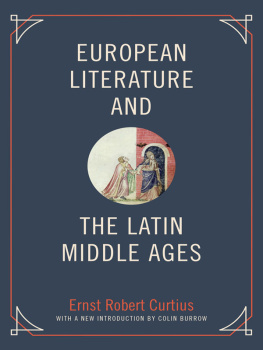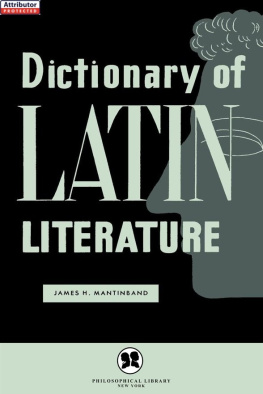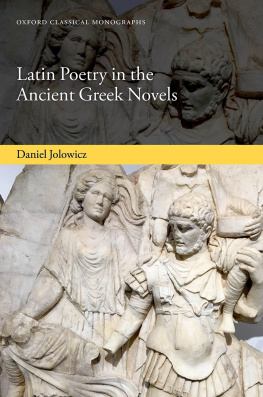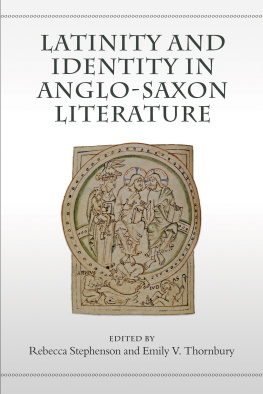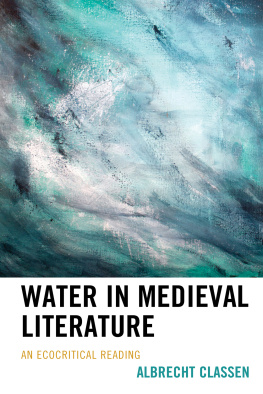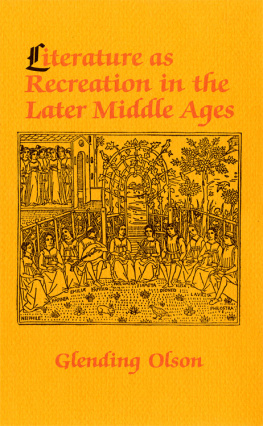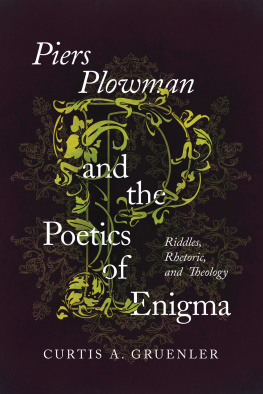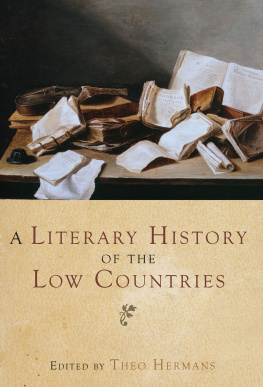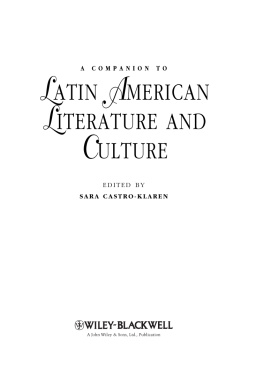
BOLLINGEN SERIES XXXVI

Ernst Robert Curtius
EUROPEAN LITERATURE AND THE LATIN MIDDLE AGES
Translated from the German
by WILLARD R. TRASK
With a new introduction by COLIN BURROW

BOLLINGEN SERIES XXXVI
PRINCETON UNIVERSITY PRESS
PRINCETON AND OXFORD
COPYRIGHT 1953 BY BOLLINGEN FOUNDATION, INC.
COPYRIGHT RENEWED 1983 BY PRINCETON UNIVERSITY PRESS
INTRODUCTION TO THE 2013 EDITION
COPYRIGHT 2013 BY PRINCETON UNIVERSITY PRESS
PUBLISHED BY PRINCETON UNIVERSITY PRESS, 41 WILLIAM STREET, PRINCETON, NEW JERSEY 08540
IN THE UNITED KINGDOM: PRINCETON UNIVERSITY PRESS, 6 OXFORD STREET, WOODSTOCK, OXFORDSHIRE OX20 1TW
PRESS.PRINCETON.EDU
COVER ART: MS 597/1424, FOL.48. DANTE AND VIRGIL ENTERING A FORTRESS SURMOUNTED BY OWLS, FROM CANTICO DEL INFERNO BY DANTE ALIGHIERI (12651321) (VELLUM), ITALIAN SCHOOL (14TH CENTURY) / MUSE COND, CHANTILLY, FRANCE / GIRAUDON / THE BRIDGEMAN ART LIBRARY.
ALL RIGHTS RESERVED
THIS BOOK CONSTITUTES NUMBER THIRTY-SIX IN THE SERIES OF WORKS
SPONSORED BY BOLLINGEN FOUNDATION
PUBLISHED IN HARPER TORCHBOOK EDITION, 1973
FIRST PRINCETON/BOLLINGEN PAPERBACK PRINTING, 1973
PAPERBACK REISSUE, WITH A NEW INTRODUCTION
BY COLIN BURROW, 2013
LIBRARY OF CONGRESS CONTROL NUMBER 2012952561
ISBN 978-0-691-15700-9
BRITISH LIBRARY CATALOGING-IN-PUBLICATION DATA IS AVAILABLE PRINTED ON ACID-FREE PAPER.
PRINTED IN THE UNITED STATES OF AMERICA
1 3 5 7 9 10 8 6 4 2
CONTENTS
INTRODUCTION TO THE 2013 EDITION COLIN BURROW
In my first year as an undergraduate one of my lungs collapsed. This limited my future career options. Becoming a trumpeter or a professional footballer was clearly no longer on the cardsnot that I was much good at kicking a ball or blowing a trumpet anyway. It had the more immediate consequence that I had to spend a week in Papworth Hospital in Cambridgeshire, where they had recently performed the first successful heart-lung transplant. In order to avoid meeting the eye of surgical staff on the lookout for further opportunities for medical innovation, I decided to bury my head in a big fat book. So I took with me the fattest book on my shelves: E. R. Curtiuss European Literature and the Latin Middle Ages.
Very soon I was lost. I was also, perhaps, slightly high, since I was breathing oxygen in case the lung collapsed again. But as I worked through this amazing book, with its gloriously rich descriptions of rhetorical figures and topoi, its learned miscellany of excursuses, and its unifying passion for an idea of Western literature that ran on at least up until Goethe, I realized that there were better things to do with life than kick balls or blow trumpets. What Curtius presents is not just a piece of literary criticism, or a literary history, or a survey of medieval literature. He enables his readers to see how Western literature is held together by a series of interconnections across timeroughly from Virgil to Diderotand across Europe, from Naples in the South to Stratford-upon-Avon in the North, and from the Iberian peninsula in the West to the Rhine, and possibly even as far as the Elbe, in the East. Curtius shows how the Latin writing of antiquity and late antiquity spread through Western Europe, flickered through the vernacular romances of France, shaped the work of what he saw as its greatest figures, Dante and Goethe, and even extended to the benighted northern climate of England. His defiance of national boundaries issues in some splendidly counterintuitive claims (Paris is the literary capital of England, p. 35; A community of great authors throughout the centuries must be maintained if a kingdom of the mind is to exist at all, p. 397). His principal thesis is that the classical tradition spread and sustained itself through the study of rhetoric, and that the chief way in which that continuity was manifested was through the recurrence of topoi, or rhetorical commonplaces. These included notions that could be digested into a single phrase, such as the puer senex, the prematurely aged youth (a topos that particularly appealed to me as I lay on my hospital bed), or which could be treated variously and at length, such as the notion that the whole world was a book.
This particular book certainly is a world. European Literature and the Latin Middle Ages belongs with Frank Kermodes Sense of an Ending and Erich Auerbachs Mimesis as one of the three most inspiring works of literary criticism written in the twentieth century. All three of these works demonstrate a kind of literary criticism that involves looking for the large patterns and histories behind a wide range of texts, and which requires the critic to work across large swathes of time and national boundaries. All three books also combine that breadth of vision with the philologists microscopic concern for detail. Like Auerbach, Curtius was trained in German traditions of romance philology in the very early twentieth century. Because Auerbach (18921957) was Jewish, he was forced to leave his university post at Marburg in 1935, and composed Mimesis in exile in Istanbul. His rapid-fire study of the history of European realism, through a series of vividly analyzed instances from books that happened to be available in Istanbul, is very different from the long slow burn of Curtiuss survey of topoi, which diffuse from Statius, through Alan of Lille and the Archpoet, into Shakespeare and Caldern. But Mimesis and European Literature and the Latin Middle Ages share one key attribute: they both show why literary study matters, and why it is intellectually, and perhaps also politically, important for the critic not to be bound to a single place or time.
Why politically? Both of these German scholars were attempting to take stock of the Western literary canon after the large-scale destruction
Ernst Robert Curtius (18861956) was the grandson of Ernst Curtius, the great classical scholar and archaeologist who excavated Olympia. His great-uncle was also a celebrated classical philologist. Curtius was brought up in Alsace, where he was born in 1886, only sixteen years after the region had been ceded to Germany at the conclusion of the Franco-Prussian War. His father was president of the Church of the Augsburg Confession in Strasbourg from 1903 to 1914. Curtius consequently grew up in an environment that mingled German Lutherans and largely Catholic French speakers. His background was both classical and polyglot, and was about as middle-European as its possible to be. His experience of religious and linguistic diversity in Strasbourg is one of the foundations of European Literature and the Latin Middle Ages.
Curtius was trained in classical philology at the University of Strasbourg by the highly systematic Romance philologist Gustav Grber (1844-1911), to whom he dedicated three of his books, including this one. Curtius and Eliot continued to correspond through the 1920s, and Curtius translated The Waste Land into German (for which edition he wrote an extremely perceptive introduction) in 1927.
This may sound like an odd intellectual background for the author of a book on European Literature and the Latin Middle Ages. Curtius himself, in an essay originally intended as an introduction to this book, presented his movement away from the study of recent French writing into the Middle Ages as a personal journey along the road to Rome in other words in a sense that transcended history, the holy city. The work, published the year before Hitler became chancellor, aligned mass mobilization and mass education with Nazi barbarism. It was, for obvious political reasons, the last monograph Curtius published before
Next page
